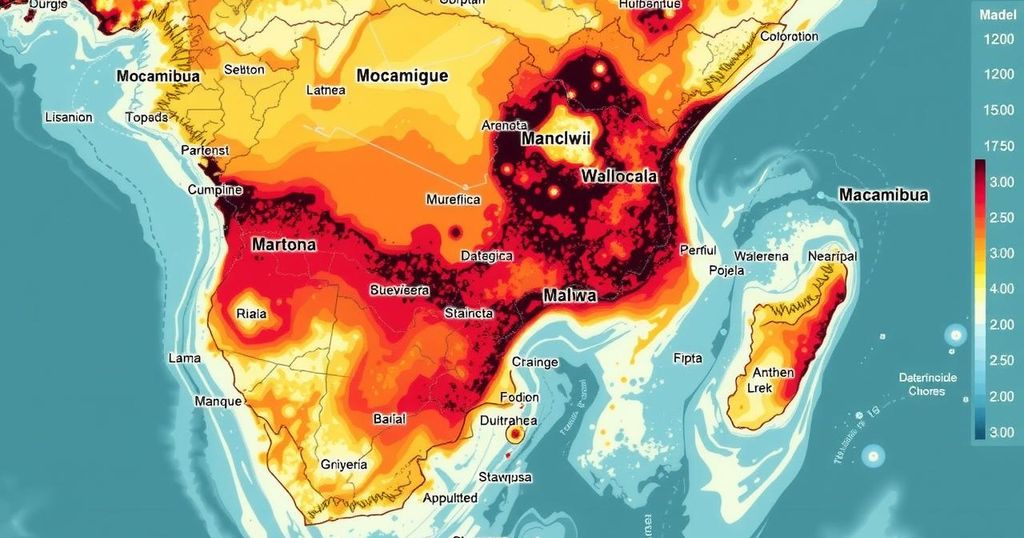Cyclone Chido: A Wake-Up Call for Mozambique and Malawi Amidst Climate Challenges

Cyclone Chido has devastated northern Mozambique and Malawi, displacing thousands and highlighting the increasing frequency of extreme weather events due to climate change. Heavy rains caused significant damage, urging immediate humanitarian response and long-term implications for education and health. Enhanced preparedness efforts in Malawi demonstrate improved coordination in combating these challenges, yet ongoing support is crucial for recovery and resilience against future climate impacts.
The turmoil brought by Cyclone Chido has left northern Mozambique devastated, having struck on December 15, 2024, moving from the eastern coast of Africa and impacting Malawi as well. In Mozambique’s Cabo Delgado and Nampula provinces, thousands have been displaced due to extreme weather patterns reflected in this cyclone, mirroring the increased frequency of torrential storms in the region driven by climate change. Earlier cyclones, including Freddy in 2023 and Idai in 2019, have similarly wreaked havoc on Southern Africa, emphasizing a worrying trend. As Lucy Mtilatila, Director of Climate Change and Meteorological Services in Malawi, stated, “It’s all because with global warming, the temperatures on the Indian oceans are increasing more than normal. And that is creating a conducive environment for these cyclones to develop.”
Cyclone Chido caused winds hitting 260 km/h (160 mph) and heavy rainfall over 250 millimeters (10 inches) within a day, compounding the challenges faced by already vulnerable regions. The aftermath reported fatalities, damage to vital infrastructure, and the urgent response of humanitarian organizations. Guy Taylor from UNICEF articulated concerns regarding the immediate and long-term impacts of the cyclone, especially on children’s education and health, defining a comprehensive pressing need for support.
Emergency shelters have been established for approximately 2,800 displaced individuals, yet the extent of the damage remains uncertain, particularly in districts where communication was hampered by power outages. Mozambique is still recuperating from the destruction passed by previous cyclones, with authorities like Luisa Meque from the National Institute for Risk and Disaster Management rating Cyclone Chido’s intensity similar to that of Cyclone Freddy. In Malawi, which experienced school closures across numerous districts, preparations and inter-sector coordination have improved in response to the cyclone.
The Malawian government’s prior ordering of food and relief supplies highlights a proactive approach against the impending impact of Cyclone Chido, particularly as the country grapples with food insecurity exacerbated by drought conditions. Mtilatila underscored the necessity of planning vulnerable community relocations, constructing resilient infrastructure, and adapting agricultural practices for improving disaster resilience.
The international community’s involvement in supporting relief efforts remains crucial in combating the effects of climate change-induced cyclones. In summarizing the situation, Mtilatila remarked, “As we are being impacted by these cyclones, we are learning a lot. So, as we are building back, we do it better so that we should not make ourselves vulnerable.”
The article outlines the devastating impacts of Cyclone Chido on Mozambique and Malawi, emphasizing the broader context of increasing cyclone frequency linked to climate change. Historical references to previous storms illustrate a worrying trend in Southern Africa, where climatic shifts are manifesting as extreme weather events. The vulnerability of these regions, particularly in terms of infrastructure and humanitarian preparedness, is highlighted. The article also discusses the urgent need for international support to address the impacts of climate change and the importance of proactive disaster management.
In conclusion, Cyclone Chido serves as a stark reminder of the increasing climate challenges faced by Mozambique and Malawi. The cyclone has displaced thousands and caused significant destruction, underscoring the urgent need for improved resilience strategies and international support. As these countries continue to grapple with the aftermath of such disasters, it is imperative to incorporate lessons learned into future disaster preparedness and infrastructure planning to mitigate vulnerabilities.
Original Source: www.dw.com






